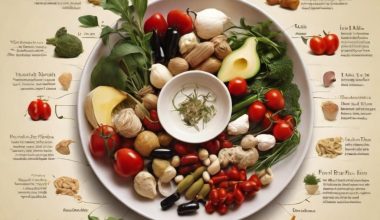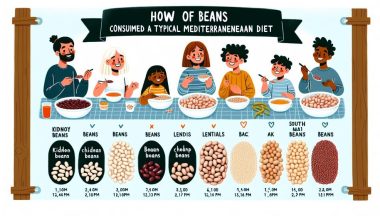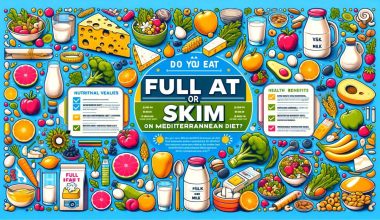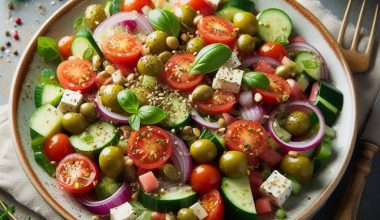The Mediterranean Diet emphasizes plant-based meals, healthy fats, and lean proteins, diverging from diets like Keto or Paleo with its less restrictive approach and absence of processed foods. It often ranks highly for its focus on heart health and sustainability compared to more rigorous or calorie-restrictive diets.
Embracing the dietary traditions of countries bordering the Mediterranean Sea, the Mediterranean Diet stands out for its nutritional richness and health benefits. This diet’s hallmark is its balance, which incorporates an abundance of fruits, vegetables, whole grains, nuts, and seeds, alongside moderate amounts of fish and poultry.
Unlike stringent low-carb or high-fat diets, it allows a broad range of food groups, making it easier to sustain in the long term. Praised for its cardiovascular benefits, it also aligns with weight management and longevity aspirations. Its less restrictive nature, compared to something like the Atkins Diet, provides a lifestyle approach to eating that can be adapted seamlessly into various cultures and preferences, making it a versatile and widely acceptable dietary plan for a global audience seeking a healthier way of life.
Origins And Principles Of The Mediterranean Diet
Embark on a journey to the sun-kissed shores of the Mediterranean. Here, an ancient diet continues to thrive, offering a pathway to good health. This diet draws from a rich cultural tapestry. It revolves around fresh, wholesome food. It emphasizes quality over quantity. The Mediterranean Diet stands as a beacon of balanced eating, inspired by the eating habits of countries bordering the Mediterranean Sea, such as Greece, Italy, and Spain.
Roots In Regional Eating Habits
The Mediterranean Diet is deeply rooted in local traditions. It blossomed in communities where fresh produce was abundant. Family meals were vital, often shaping social interactions. Sun-drenched fields provided fruits and vegetables. Seas teemed with fish. Olive groves offered rich oils. All these elements combined to form the backbone of this enduring diet.
Key Components And Food Groups
At the heart of the Mediterranean Diet, you’ll find a variety of key foods:
- Fruits and vegetables form the foundation, showcasing a rainbow of nutrients.
- Whole grains bring sustenance and energy.
- Lean proteins, such as poultry and fish, take precedence over red meats.
- Nuts and seeds offer a crunch of heart-healthy fats.
- Olive oil replaces other fats, linking every dish with a golden thread.
- Herbs and spices add flavor without the salt.
This blend ensures a symphony of tastes and a tapestry of nutrition. It fosters wellness and longevity, distinguishing the Mediterranean Diet from its contemporaries with ease and flavor.
Popular Diets Across The Globe
Many diets promise health and weight loss benefits. Around the world, people follow various eating patterns to meet their health goals. Some diets focus on reducing certain food types, while others emphasize eating at specific times. Let’s explore how they stack up against the Mediterranean Diet.
Keto: High Fat, Low Carb
Rich in fats and low in carbs, the Keto diet transforms how your body gets energy. Instead of using carbohydrates, your body burns fat for fuel. This diet includes:
- Meats
- Cheese
- Fatty fish
- Nuts and seeds
Fruit and grain consumption is minimal. Contrast this with the Mediterranean diet’s rich fruit and whole grain profile.
Veganism: Plant-based Living
This lifestyle shuns all animal products. Only plant-derived ingredients make it to the plate. Key components include:
- Vegetables
- Fruits
- Legumes
- Whole grains
- Nuts and seeds
Veganism and the Mediterranean diet both praise plant foods, but the latter includes modest amounts of fish and dairy.
Paleo: The Caveman Blueprint
Based on ancient dietary habits, Paleo endorses eating like our ancestors. It suggests a high protein, low processed food diet. Common Paleo foods are:
- Lean meats
- Fish
- Fruits and vegetables
- Nuts and seeds
Grains and dairy, staples in the Mediterranean diet, don’t fit into the Paleo plan.
Intermittent Fasting: Cycling Between Eating And Fasting
This is not a diet but a pattern of eating. It’s about when to eat, not what to eat. Popular methods include:
| Method | Description |
|---|---|
| 16/8 method | Eat during an 8-hour window, fast for 16 |
| 5:2 diet | Normal eating for 5 days, restrict calories for 2 |
The Mediterranean diet allows for flexibility in meal timing, differing from the strict schedule of intermittent fasting.
Nutritional Profile Comparison
Exploring the nutritional landscape of various diets reveals diverse approaches to health and wellness. The Mediterranean diet, celebrated for its balanced and wholesome qualities, stands out among them. Understanding how it stacks up against other diets requires a detailed look at the nutrients it delivers. Three primary components shape the backbone of our comparison: macronutrients, essential vitamins and minerals, and the presence of fiber and antioxidants. Let’s delve into these areas to ascertain the distinctness of the Mediterranean diet.
Macronutrient Ratios
The Mediterranean diet promotes healthy fats, lean proteins, and complex carbohydrates. It contrasts with high-protein, low-carb trends or fat-centric regimens like keto. A balanced macronutrient distribution ensures sustained energy and proper body function. Here’s how it compares:
- Fats: Primarily from olive oil, nuts, and fish, rich in monounsaturated and omega-3 fats.
- Proteins: Moderate intake focusing on fish, poultry, legumes, and less on red meat.
- Carbohydrates: High in complex forms from whole grains, fruits, and vegetables.
Vitamins And Minerals Content
The diverse palette of the Mediterranean diet is a powerhouse of essential vitamins and minerals. It surpasses many diets that restrict food groups, potentially causing nutrient deficits.
| Key Nutrients | Mediterranean Diet | Other Diets |
|---|---|---|
| Vitamin C and E | High (Fruits, Vegetables) | Varied |
| Calcium, Iron, Magnesium | Abundant (Leafy Greens, Nuts) | Varied |
| Potassium | Ample (Bananas, Potatoes) | Varied |
Fiber And Antioxidants Presence
Rich fiber content and antioxidants are cornerstones of the Mediterranean diet. They far outpace other diets that may be lower in these crucial elements.
The dietary fiber from whole grains, fruits, and vegetables aids digestion and heart health.
Antioxidants from colorful plant foods combat inflammation and protect against disease.
- Berries and citrus fruits for a vibrant variety of antioxidants.
- Leafy greens and whole grains for robust fiber intake.
Health Benefits Showdown
Welcome to the Health Benefits Showdown, where the celebrated Mediterranean diet steps into the ring against other popular eating plans. Each contender fights for the top spot in health benefits. Find out how this ancient diet stacks up in the battle for overall wellness.
Heart Health And Cholesterol Levels
The Mediterranean diet is renowned for its heart-healthy effects. Rich in olive oil, nuts, and fish, this diet keeps the heart robust. In contrast, many diets lack balance, leading to higher cholesterol levels. Olive oil’s unsaturated fats help lower bad cholesterol, giving the Mediterranean diet a clear edge in this matchup.
Weight Management And Obesity
When it comes to weight management, the Mediterranean diet has a strong record. Portion control and high-fiber content lead to natural weight loss. Other diets can be restrictive, causing cravings and binges. Plenty of fruits, vegetables, and legumes provide lasting fullness on this diet, making it easier to maintain a healthy weight.
Diabetes And Blood Sugar Control
Controlling blood sugar is crucial for diabetes management. The Mediterranean diet’s low-glycemic foods, such as whole grains and leafy greens, support stable blood sugar levels. Many fad diets lack this balance, swinging blood sugar levels wildly. Regular intake of fiber and healthy fats place the Mediterranean diet ahead for those with diabetes.
Longevity And Disease Prevention
Seeking a long and healthy life? The Mediterranean diet might be your ally. It is associated with reduced risks of certain cancers and neurodegenerative diseases. Its variety in nutrients is unmatched by most diets, resulting in better health outcomes and potentially a longer lifespan. Such a well-rounded approach is hard to beat for disease prevention.
Cultural And Lifestyle Adaptations
When exploring how the Mediterranean diet stacks up against other diets, we can’t ignore the cultural and lifestyle adaptations it brings to the table. The essence of this diet lies not just in the foods consumed but also in the way they are woven into daily life. It’s a holistic approach that marries nutrition with cultural practices, promoting a well-rounded lifestyle. Below, delve into the flexibility, regional influences, and social aspects that make the Mediterranean diet a unique and adaptable eating plan.
Flexibility Of Diet Choices
The Mediterranean diet stands out owing to its inherent flexibility. Unlike rigid diet plans, it allows for personal adjustments. This adaptability ensures individuals can tailor their food choices to meet both dietary needs and personal preferences. It’s a diet that encourages variety and experimentation with flavors.
Influence Of Regional Cuisines
A key characteristic of this diet is its deep roots in regional cuisines. Foods reflect the seasonal bounty and traditions of the Mediterranean region. Olive oil, fresh fruits, vegetables, fish, and whole grains dominate, all inspired by the diverse culinary practices of countries like Greece, Italy, and Spain.
Dining Experience And Social Aspects
Beyond the food itself, the Mediterranean diet emphasizes the dining experience and social aspects of eating. Meals are events for family and friends to gather and bond. This communal aspect supports emotional well-being and reflects a lifestyle where pace and enjoyment are just as important as the food on the plate.
Environmental And Ethical Considerations
Considering the planet’s health alongside our own is crucial. The Mediterranean diet isn’t just about delicious flavors. It’s also about making choices that are kind to the earth. Let’s dive into how this diet respects our environment and animal friends.
Sustainability And Food Source
The Mediterranean diet emphasizes seasonal and local produce, reducing transportation emissions. This approach supports sustainable farming practices. Here’s how it compares:
- Reduces Carbon Footprint: Shorter food miles mean fewer greenhouse gases.
- Encourages Biodiversity: Diverse crops lead to a balanced ecosystem.
- Conserves Water: Uses less water-intensive crops and methods.
Animal Welfare And Environmental Impact
When it comes to meat, the Mediterranean diet includes it sparingly. This implies less demand for factory farming, which often neglects animal welfare. Eating more plant-based foods lowers the strain on natural resources. Let’s see the advantages:
| Aspect | Benefit |
|---|---|
| Better Living Conditions | Animals are not overbred or cramped. |
| Reduced Pollution | Less waste and chemicals from large-scale meat production. |
| Conservation of Habitats | Lower need for deforestation for grazing land. |
Practicalities Of Diet Adherence
Exploring the Mediterranean Diet reveals not just a path to healthier eating, but an approach to food that can be enjoyable and sustainable. A critical factor in the success of a diet is how easily one can adhere to it long-term. This depends on various practicalities from ingredient availability to the cost and complexity of meal prep. Let’s dive into how the Mediterranean Diet stacks up in these areas.
Ease Of Access To Ingredients
Ingredients for the Mediterranean Diet are easy to find in most supermarkets. Fresh fruits, vegetables, whole grains, and seafood are staples. You’ll also see olive oil, nuts, and legumes frequently. Unlike some restrictive diets that require specialized or hard-to-find items, this diet is based on common foods found all around the world.
- Ubiquitous fresh produce
- Common whole grains like rice, pasta, and bread
- Accessible seafood and poultry
Cost Comparison
Cost-effectiveness is where the Mediterranean Diet really shines. It emphasizes plant-based ingredients, which tend to be more affordable than high-priced meats and processed foods. Eating seasonally can further reduce expenses.
| Mediterranean Diet | Other Diets |
|---|---|
| Seasonal vegetables and fruits | Often requires organic or exotic items |
| Bulk legumes and grains | May rely on costly meat and dairy products |
| Occasional seafood | Regular consumption of expensive supplements |
Meal Planning And Preparation
The Mediterranean Diet doesn’t demand hours in the kitchen. Many meals are quick and simple to prepare, focusing on freshness and flavor. Meal prep often involves an assembly of ingredients more than complex cooking techniques. This lays a foundation for a sustainable, enjoyable diet routine.
- Choose a variety of colors and textures for salads.
- Grill or bake fish with herbs for tasty protein.
- Opt for whole grains to create fulfilling sides.
Real-life Success Stories And Research
Discover the impacts of the Mediterranean Diet through real stories and scientific research. Individual experiences highlight the diet’s effectiveness. Research findings back this up. Together, they paint a picture of how the Mediterranean Diet stands out from others.
Testimonials And Transformations
Real people, real results. That’s the power of the Mediterranean Diet. See how it has changed lives:
- Sarah lost 30 pounds and kept it off.
- David reduced his medications for high blood pressure.
- Lisa gained energy and improved her skin health.
These stories inspire others to consider their food choices. The Mediterranean Diet isn’t just a diet, it’s a lifestyle change.
Scientific Studies And Findings
Studies show the Mediterranean Diet has many benefits. Here are key findings presented as a table:
| Study | Outcome |
|---|---|
| New England Journal of Medicine | Reduced heart disease risk |
| Annals of Internal Medicine | Better cognitive function |
| Diabetes Care | Improved blood sugar levels |
Research confirms that the diet leads to health improvements. It’s effective and sustainable.
The Verdict
The Verdict on the Mediterranean diet shines brightly as we stack it up against other eating patterns. This section delves into how well it aligns with individual goals and its potential for long-lasting health benefits. Let’s dissect the essential points to determine if this diet is a top contender for a healthy lifestyle overhaul.
Matching Diet To Personal Goals
Finding the right diet starts with defining personal health goals. The Mediterranean diet is a powerhouse for heart health, weight management, and promoting longevity. Its rich variety of fruits, vegetables, and healthy fats align with the objectives of decreasing disease risk and maintaining a balanced diet.
- Heart Health: Olive oil and nuts, staples of the Mediterranean diet, support a strong heart.
- Weight Loss: High in fiber, it helps control appetite and caloric intake.
- Chronic Disease Prevention: Antioxidant-rich foods lower the risk of certain diseases.
Considerations For Long-term Success
Sustaining a diet over time is the true test of its efficacy. The Mediterranean diet scores high for being enjoyable and easy to stick with. Unlike restrictive diets, it offers a broad array of flavors and ingredients, keeping mealtime interesting and satisfying.
| Factor | Mediterranean Diet | Other Diets |
|---|---|---|
| Variety | High | Varies |
| Sustainability | Strong | Varies |
| Enjoyment | High | Varies |
| Nutrition | Well-Balanced | Varies |
The table showcases the Mediterranean diet against other diets, highlighting its sustainability and nutritional balance. Its flavors encourage a lasting, healthy relationship with food.
Frequently Asked Questions On How Does The Mediterranean Diet Compare To Other Diets
What Is The Mediterranean Diet?
The Mediterranean Diet emphasizes eating primarily plant-based foods, like fruits, vegetables, whole grains, legumes, and nuts. It replaces butter with healthy fats, such as olive oil, and suggests using herbs and spices instead of salt to flavor foods.
How Does The Mediterranean Diet Benefit Health?
Adhering to the Mediterranean Diet can lead to significant health benefits, such as reduced risks of heart disease and stroke. It has also been linked to lower levels of LDL cholesterol, the “bad” cholesterol that’s a contributing factor to heart disease.
Is The Mediterranean Diet Better Than Keto?
While the Mediterranean Diet focuses on high-fiber foods and healthy fats, the Keto diet emphasizes high fat, moderate protein, and very low carbohydrate intake. The Mediterranean Diet is generally considered more sustainable and balanced compared to the restrictive nature of Keto.
Can You Lose Weight On The Mediterranean Diet?
Yes, the Mediterranean Diet can lead to weight loss. It’s rich in foods that are filling and high in fiber, which can help control appetite and reduce calorie intake without the need for calorie counting.
Conclusion
Exploring various diets can enlighten your path to health and fitness. The Mediterranean Diet stands out for its flavor, balance, and heart-healthy benefits. Compared to other nutritional plans, it’s not just a diet, but a sustainable lifestyle choice. Embrace the Mediterranean way for a happier, wholesome life.







